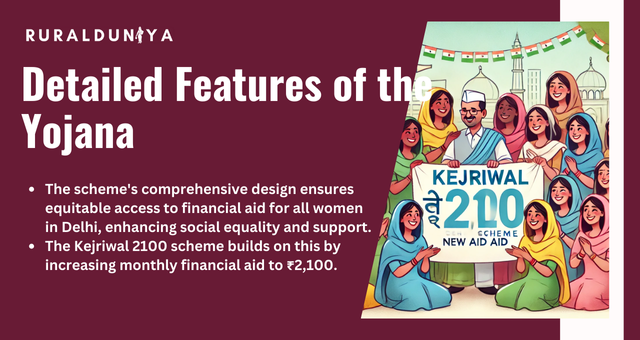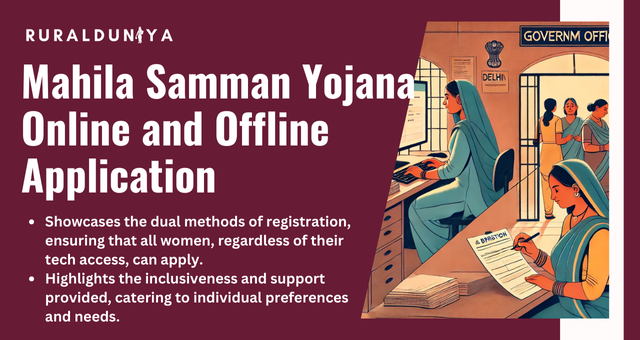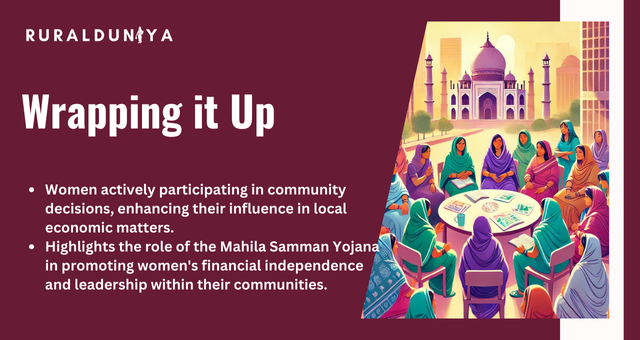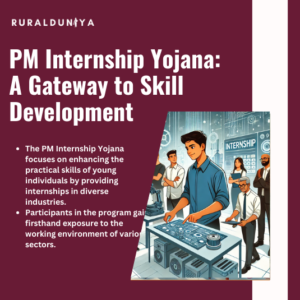The Mahila Samman Yojana is a special project by the Delhi government that gives a monthly stipend to women to make it easier for women to handle their daily expenses, pay for school, or take care of health needs.
It boosts their independence and power in managing money.
Mahila Samman Yojana: Empowering Women in Delhi

Started by Chief Minister Arvind Kejriwal, Mahila Samman Yojana puts ₹2,100 each month into the bank accounts of eligible women over 18 living in Delhi. It’s aimed at helping them continue their education, handle medical expenses, and improve their overall financial freedom.
This initiative is part of a broader push to address gender inequality and empower women economically. The scheme also encourages women to participate more actively in the community and local economies, thereby promoting social inclusion.
Moreover, by providing this financial autonomy, the initiative fosters an environment where women can make decisions that directly benefit their personal and professional growth.
Mahila Samman Yojana in Delhi
Designed for the diverse population of women in Delhi, this scheme provides a steady stream of income that helps women from various backgrounds. For example, it helps young students like Rani, who uses her monthly money to buy books and pay for classes.
It shows how the yojana supports women’s education in the city. Additionally, it assists entrepreneurs like Priya, who invests the funds into her start-up business, enhancing her ability to contribute economically.
The scheme also aids elderly women, giving them a financial cushion to cover essential healthcare costs.
Benefits of Mahila Samman Yojana
The benefits of yojana are –
- Steady Monthly Income: Helps cover everyday costs and reduces financial stress.
- Support for Education: Allows young women to stay in school or college.
- Better Healthcare: Makes medical care more affordable.
- Financial Independence: Encourages women to make their own money decisions and feel empowered.
Detailed Features of the Yojana

The Yojana’s comprehensive design ensures that every woman in Delhi, regardless of her background, has access to this financial aid. This approach guarantees that the funds reach those most in need, enhancing equality and fostering community support.
By distributing this aid widely, the scheme promotes a sense of fairness and inclusivity throughout the diverse populations of the city.
Building on this framework, the Kejriwal 2100 scheme aims to further extend financial support, proposing to increase the monthly aid to ₹2,100, thus broadening the impact and scope of assistance provided to women.
Eligibility Criteria for Mahila Samman Yojana
- Who Can Apply: Women over 18 who live in Delhi.
- Who Cannot Apply: Women who already get financial aid from other government schemes or who are government employees or taxpayers.
Mahila Samman Yojana at the Post Office
For those who find online processes challenging, post offices also provide forms. This helps make sure that all women, especially those in harder-to-reach areas, can apply.
Mahila Samman Yojana Registration Link
- Where to Register: Delhi Government e-District Portal
- How to Fill Out the Form: You can get the form online or at government offices. Just fill in your details and hand in the needed papers.
Mahila Samman Yojana Online and Offline Application Procedures

Women can sign up for this scheme online through a simple form or they can visit a government office if they prefer. This ensures that everyone can apply, no matter their access to technology.
The dual application methods cater to those who may need assistance or prefer a more personal interaction when registering. This inclusivity helps to bridge the digital divide and ensures the program’s benefits are accessible to all eligible women in Delhi.
Interest Rate and Financial Planning
Although the scheme doesn’t work like a bank savings account and doesn’t offer an interest rate, it provides direct cash support. This helps women like Anita, a small shop owner, use the extra funds to grow her business.
Implementation Across States: Specifics for MP, Jharkhand, and Gujarat
While this scheme is for Delhi, its approach could inspire similar programs in other states, adapted to their local needs and conditions. This could lead to broader changes in women’s financial help across India.
By showcasing successful implementation and tangible benefits, the yojana might serve as a model for policymakers seeking to enhance women’s empowerment in their regions.
Furthermore, the positive outcomes from this program could encourage more states to adopt and adapt such schemes, expanding the impact on women’s financial independence nationwide.
Mahila Samman Yojana Official Website
Check out the official website for all the details on how to apply, what documents you need, and who can get this help.
Wrapping it Up

The Mahila Samman Yojana is a key part of improving women’s lives in Delhi. By directly helping with cash, it not only eases immediate money worries but also supports bigger changes for gender equality in society.
As the program grows, its influence on improving women’s financial situations and self-reliance will continue to be a model for other regions. Additionally, this initiative could significantly boost women’s roles in economic decision-making within their communities.
FAQs
Who is eligible for Mahila Samman Yojana?
Any woman over the age of 18, residing in Delhi, who is not a government employee or taxpayer, can apply for this scheme.
How can I apply for the Mahila Samman Yojana?
You can apply online through the Delhi government’s e-district portal or by visiting a designated government office or participating post office.
How much financial assistance does Mahila Samman Yojana provide?
The scheme initially provides ₹1,000 per month to eligible women, with plans to increase this amount to ₹2,100 under the Kejriwal 2100 scheme.
What can Mahila Samman Yojana funds be used for?
Funds from the scheme can be used for educational expenses, healthcare, daily living costs, or to support small business initiatives.

Nishank is a social impact enthusiast with a solid foundation in public policy, micro-enterprise, and agribusiness. Growing up in a farmer’s family has given him a profound connection to rural communities, fueling his passion to empower people towards self-reliance. He completed his undergraduate studies at the Delhi University and earned a master’s degree in Rural Management from National Institute of Rural Development & Panchayati Raj in Hyderabad.



